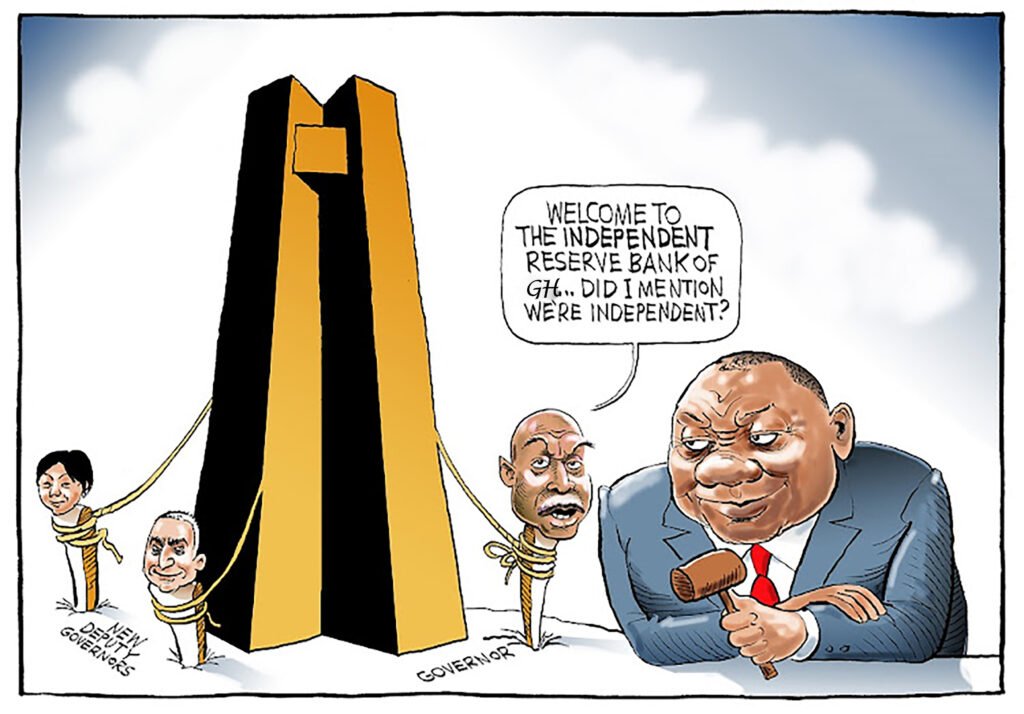Ghana’s currency, the cedi, has been on a tumultuous journey, marked by volatility and a persistent decline in value. The fluctuation of the cedi against major international currencies has not only impacted the country’s economy but has also posed significant challenges for businesses and individuals alike.
While short-term interventions have been made to stabilize the cedi, lasting solutions are essential to ensure sustained economic growth and stability. Identifying the root causes of the cedi’s instability will essentially give birth to workable strategies for its rescue, culminating to a more stable and prosperous future for Ghana.
Currently, in a concerning economic development, the cedi, has experienced a significant depreciation against the US dollar, marking a 14.6% decline as of May 2024. This depreciation, although slightly lower than the approximately 20% loss observed in the retail market, accentuates ongoing challenges facing the nation’s economic stability.
The cedi’s recent performance against the dollar reflects a concerning trend. In March 2024, the currency lost 7.7% of its value to the dollar, followed by a further depreciation of 10.5% in April of the same year. On the retail market, the cedi is currently averaging GH¢15 against the dollar. However, the Bank of Ghana (BoG) presents a more favorable exchange rate, quoting a dollar to GH¢13.01. This variance highlights the complexity of currency dynamics and the challenges inherent in stabilizing exchange rates.
The cedi’s struggles extend beyond the dollar, with depreciation observed against other major currencies as well. Against the British pound, the cedi has depreciated by 14.5%, trading at GH¢17.70. Similarly, the euro has witnessed a 12.9% decline in value against the cedi, selling at GH¢15.07. These successive declines have raised alarms among both policymakers and the public, prompting urgent measures to address the situation.
One of such analysts is Dr. Richmond Akwasi Atuahene, Corporate Governance/Banking Consultant who lent his voice to the raging debate of the causes of the cedi’s woes and how to find a lasting solution to the currency’s depreciation problems.

Causes of the Recent Persistent Cedi Depreciation
The depreciation of the Ghanaian cedi can be attributed to various factors, including the country’s heavy dependence on raw commodity exports.
According to Dr. Richmond Akwasi Atuahene, Ghana’s economy has historically been dependent on the export of raw materials, a structure designed during the colonial era under Sir Gordon Guggisberg. Cocoa, timber, gold, and other minerals remain the country’s major exports, with oil and non-traditional commodities recently added. This reliance on exporting raw materials and importing finished goods has led to chronic trade and current account deficits.
Consequently, the demand for foreign currencies consistently exceeds the supply, contributing to the persistent depreciation of the Cedi. The situation is exacerbated by seasonal factors, such as the repatriation of profits by multinational companies between March and May, and local businesses settling debts post-Christmas season.
“Depreciation is a currency’s exchange rate falling against other currencies. Economic fundamentals, interest rate differentials, political instability, or investor risk aversion can cause currency devaluation. Countries with weak economic fundamentals, such as persistent current account deficits and excessive inflation, have declining currencies. Orderly and progressive currency depreciation increases export competitiveness and may reduce trade imbalance.
“Ghana imports and exports raw commodities. Ghana needs foreign currency but has a limited supply. The Cedi depreciates against major currencies occasionally. Ghana’s currency, the Cedi, is depreciating against the US and is now one of the worst-performing global currencies. This is one of the main factors of the inflation rate in Ghana. A weakened currency means that hikes in import costs are passed on to individuals within the country, adding pressure to already higher costs of food and transportation.”
Moreover, foreign direct investment in Ghana has declined over the past two years, exacerbated by the country’s default on external debt obligations. Inflows fell by 39% in 2022 and continued to decline in 2023. Macroeconomic instability, high inflation, and high interest rates have deterred foreign investors, contributing to the Cedi’s depreciation. Ghana’s inability to attract sufficient capital flows has made it difficult to maintain a stable exchange rate.
Ghana’s rising public debt, coupled with declining donor support and falling cocoa production, has put additional pressure on the exchange rate. The surge in demand for imports has resulted in recurrent currency crises, with the Cedi depreciating by over 40% between 2022 and 2024. A sharp decline in the value of the Cedi, particularly against the US dollar, has made imports more expensive, further straining the economy.
Ghana’s relatively loose fiscal and monetary policies over the past four years have contributed to large currency depreciations. Investor concerns about the government’s ability to maintain fiscal discipline, particularly in election years, have led to a preference for dollar assets over Cedi assets. Expansionary fiscal and monetary policies have generated poor macroeconomic outcomes, reducing confidence and fuelling exchange rate instability. The government’s role as an employer of last resort has also burdened the fiscal position, with large budget deficits financed through the banking system, leading to inflation and balance of payments deficits.
Ghana’s exchange rate has been subject to intermittent shocks to its terms of trade and overall net external position. Events such as the Israeli-Hamas conflict in 2023 and the ongoing Russia-Ukraine war have impacted the supply and demand of crude oil and grains, contributing to the currency instability and depreciation. These external vulnerabilities highlight the need for greater economic resilience and diversification.
Under the current IMF program, the Bank of Ghana has adopted a limited intervention approach in the foreign exchange market to rebuild external buffers and determine the real value of the Cedi. This approach has been suggested by the IMF to avoid periodic interventions with limited foreign exchange reserves. However, it has also accelerated the recent depreciation of the Cedi against major trading currencies.
Ghana’s inability to generate sufficient foreign exchange through exports led to borrowing from international capital markets and issuing dollar-denominated domestic bonds to manage currency depreciation. However, the country faced a marked deterioration in fiscal and external positions, weakening economic confidence and public debt dynamics. The downgrading of Ghana’s credit ratings and the inability to borrow from international capital markets in 2022-2023 accelerated the Cedi’s depreciation. Poor cocoa production and loss of international market access further compounded the issue.
“Because Ghana isn’t able to generate enough foreign exchange through exports, successive governments have tried to manage the depreciation of the cedi through borrowing from the international capital market, issuing dollar-denominated domestic bonds, and depleting the country’s foreign exchange reserves. The country’s dependence on the Eurobond market and syndicated cocoa loans were used over the years to shore up the Bank of Ghana to ensure the stability of exchange rates. However, this year Ghana has experienced poor cocoa production and the loss of international market access in 2022 all affected the persistent depreciation of the local currency.”
The Bank of Ghana’s failure to properly track and capture inward remittances since 2019, after the passage of the Payment Systems and Service Act 2019 Act 987, has led to discrepancies between official data and World Bank estimates. Newly licensed money transfer companies and FinTech in the inward remittance space have not complied with the Foreign Exchange Act 2006 Act 723, leading to an estimated loss of nearly US$9 billion over four years. Improved remittance tracking could help stabilize the exchange rate by increasing the inflow of foreign currency.
Significant Economic Consequences of Cedi Depreciation
The recent depreciation of the cedi has sent ripples through the nation’s economy, sparking a cascade of challenges with far-reaching implications. As the cedi weakens against major international currencies, the effects are felt across various sectors, from trade and inflation to fuel prices and business operations.
One of the immediate consequences of currency depreciation is its impact on trade dynamics. Depreciation typically makes imports more expensive and exports cheaper. While some countries strategically devalue their currencies to bolster export competitiveness, Ghana’s export sector is not robust enough to capitalize on this opportunity fully. As a result, the depreciation of the cedi has not translated into a significant surge in export activity, leaving the country unable to maximize its potential gains.
Instead, the depreciation has led to a surge in the cost of imported goods, particularly intermediate goods crucial for local production. This spike in import costs has contributed to rising inflation, placing strain on consumers and businesses alike. Importers, in particular, are grappling with the challenge of financing their shipments, as the high cost of importing and clearing goods from Ghanaian ports squeezes profit margins and strains cash flow.
Furthermore, access to foreign exchange (forex) has become increasingly restricted, exacerbating trade delays and disruptions. With Ghana’s balance of payments under pressure, the Bank of Ghana is compelled to manage forex distribution carefully. Importers report facing delays in obtaining the necessary forex to finance their transactions, hindering trade flows and business operations. For instance, the Chamber of Bulk Oil Distributors has highlighted an acute shortage of forex, impeding the importation of petroleum products and contributing to uncertainties in fuel prices.
![]()
Compounding these challenges is the global dynamics of the oil market. Increased demand for crude oil, coupled with supply disruptions stemming from geopolitical tensions, has driven international oil prices upwards. As a net importer of petroleum products, Ghana finds itself particularly vulnerable to fluctuations in global oil prices. The combination of cedi depreciation and rising international oil prices foreshadows continued increases in fuel prices, further burdening consumers and businesses across the country.
Consequently, the depreciation of the Cedi has contributed to high inflation rates, with inflation reaching 25.8% year-on-year in April 2024. The prices of food and fuel have surged, eroding consumer purchasing power and reducing demand for goods. The situation has particularly affected sectors such as consumer and household goods, agricultural inputs, oil and gas, agribusiness, pharmaceuticals, and raw materials. The high cost of imports has also impacted the availability and affordability of essential goods like poultry, meat products, tomatoes, onions, and carrots.
Looking ahead, the prognosis for Ghana’s economy remains uncertain. While efforts to stabilize the cedi and mitigate inflationary pressures are underway, the persistence of external factors such as global oil market dynamics poses ongoing challenges. The trajectory of fuel prices, in particular, will continue to impact various sectors of the economy, from transportation and logistics to manufacturing and consumer goods.
Government of Ghana’s Measures to Address Cedi Depreciation
In response to the cedi depreciation and its accompanying economic challenges, the government of Ghana has implemented a series of measures aimed at stabilizing the cedi and fostering economic resilience.
One of the key strategies employed by the Ghanaian government is the fast-tracking of the fiscal consolidation process. This involves rationalizing spending and enhancing revenue mobilization to ensure fiscal discipline and stability. By tightening expenditure and increasing revenue streams, Ghana aims to mitigate the impact of currency depreciation on its economy.
Furthermore, Ghana has intensified its gold-for-oil programme as part of efforts to shore up its foreign exchange reserves. The exchange of gold for oil helps to diversify Ghana’s foreign exchange earnings and reduce reliance on a single commodity. This strategic move aims to enhance the country’s resilience to external shocks and currency fluctuations.
In addition to the gold-for-oil programme, the government has implemented appropriate foreign exchange interventions through the Bank of Ghana. These interventions aim to stabilize the currency market and prevent excessive volatility in the exchange rate. By providing liquidity and conducting targeted interventions, the Bank of Ghana plays a crucial role in maintaining exchange rate stability.
Moreover, Ghana has leveraged international support to bolster its economic resilience. The disbursement of the third tranche under the second review of the International Monetary Fund-supported Program of Credit and Policy-Performance Enhancement Grant (PC-PEG) demonstrates Ghana’s commitment to implementing sound economic policies with the support of international partners. Additionally, the disbursement of funds from other ongoing projects, such as the $150 million World Bank loan and the expected disbursement of $300 million under the World Bank Development Policy Operation 2 (DPO2), further strengthens Ghana’s economic position.
Moreover, recent interventions by the Bank of Ghana have also played a significant role in stabilizing the currency market. The provision of $59 million on the spot market and the auctioning of $20 million to Bulk Oil Distribution Companies demonstrate the central bank’s proactive approach to managing currency fluctuations. These interventions help to ensure liquidity in the foreign exchange market and maintain stability in the value of the cedi.
However, despite these efforts, the cedi continues to sink while the trajectory of the cedi remains a critical concern for Ghana’s economic outlook. This calls for prudent fiscal management and strategic interventions to address the underlying causes of currency depreciation.
Expert Solutions to Stabilize the Ghana Cedi: The Missing Link?
With the government’s solutions failing to make any impact in arresting the dollar and other major international currencies, Dr Atuahene has proposed a comprehensive approach encompassing short-term, medium-term, and long-term strategies to addressing the pressing issue of the cedi depreciation.
In the short term, Dr Atuahene noted that a critical step is to ensure regulatory compliance with existing laws, particularly the Foreign Exchange Act 2006 Act 723, by newly licensed Money Transfer Companies and Fintech Companies in the Foreign Remittances Space. Since 2019, the licensing of these entities under the Payment Service Act 987 has introduced opportunities for increased foreign remittances. However, discrepancies in reporting and compliance have hindered the full potential impact on stabilizing the exchange rate.
The government, in collaboration with the Ministry of Finance and the Bank of Ghana, must prioritize the tracking, tracing, and strengthening of the inflow of foreign remittances. By addressing weaknesses in capturing inward remittances, steps can be taken to stabilize the exchange rate, thereby mitigating the impact of currency fluctuations on the economy. This short-term solution lays the foundation for immediate intervention while paving the way for more sustainable measures in the medium and long term.
Between 2016 and 2022, the Auditor-General’s report revealed varying figures for inward remittances from 23 authorized dealer commercial banks, with amounts ranging from $1.83 billion in 2016 to $2.3 billion in 2022. However, there were significant discrepancies between these figures and the World Bank’s remittance reports on Ghana from 2010 to 2022. For example, the World Bank reported $2.1 billion in 2011 and $4.7 billion in 2022, showing differences in the percentage of GDP accounted for by remittances each year.
To address these inconsistencies, the Ministry of Finance and the Bank of Ghana need to enhance their procedures for capturing and analyzing global inward remittance data. This includes assessing the World Bank’s yearly remittance aggregates and adopting improved data sources and compilation methods to reconcile the differences between the Bank of Ghana’s data and the World Bank’s reports.
Long-Term Solutions to Ghana’s Depreciating Cedi
In the long term, Ghana must prioritize efforts to diversify its economy and reduce reliance on traditional sectors such as mining and agriculture. By fostering innovation, promoting entrepreneurship, and investing in emerging industries such as technology and renewable energy, Ghana can build a more resilient and sustainable economy.
Furthermore, enhancing economic resilience requires strengthening institutions, promoting good governance, and fostering a conducive business environment for both local and foreign investors. By implementing policies that prioritize long-term economic growth and stability, Ghana can mitigate the impact of external shocks and currency fluctuations on its economy.
According to the banking consultant, also in the long term, the Ghanaian government must initiate the re-negotiation of existing leasing contracts with mining companies operating in the country. Drawing inspiration from successful models such as Botswana’s approach with Anglo/American De Beers, Ghana can seek to increase its share of revenue from the mining sector. Currently, mining companies surrender only a fraction of their total export receipts, resulting in substantial losses for the Ghanaian economy.
“The government must adopt the Botswana Model used in their pricing strategy with Anglo-American De Beers. In fact, on the contrary, the government of Botswana, for instance, can take in revenue about 20% in 2023 and increase further 30% in 2024 to 2030 of the total value of minerals produced in Botswana. The government of Ghana should, therefore, take lessons from the Botswana Model and generate more revenue and foreign exchange from the country’s extractive sector to help create more fiscal space and successfully consolidate the country’s fiscal position.”
For instance, in 2022, despite gold production totalling US$6.6 billion, Ghana received a meagre portion of just US$863 million, equivalent to only 13.1% of the total value. Over the years, this disparity has amounted to significant revenue loss, with Ghana receiving only about 14.8% of the total value of gold extracted from 2014 to 2022. By re-negotiating leasing contracts to secure a more equitable distribution of revenue, Ghana can enhance its economic stability and bolster the value of the Ghana Cedi.
“…The various governments have helped those mining companies to ripple the country of its valuable resources all in the name of foreign direct investments. According to the Auditor General reports on Consolidated Foreign Exchange Receipts and Payments of the Bank of Ghana showed that surrendered exports by 23 mining companies of US$226 million in 2016; US$ 876 million in 2017; US$ 918 million in 2018: US$ 1 billion in 2019; US$1.1 billion in 2020; US$ 990 million in 2021; and US$ 863 million in 2022.”
Ghana’s economy has historically relied heavily on cocoa exports. While cocoa remains a crucial part of the economy, this dependence makes the country vulnerable to global commodity price fluctuations. To stabilize the cedi and ensure sustainable economic growth, Ghana must diversify its exports beyond cocoa. Key non-cocoa sectors that hold potential include rice, maize, cashews, soybeans, cassava, shea butter, tomatoes, onions, salt, and poultry products.
By investing in these areas, Ghana can enhance its trade and current account surpluses. Adding value to these products before export can further boost foreign exchange earnings. For instance, processing cashews into consumer-ready products rather than exporting raw nuts can command higher prices on the international market.
Agriculture, contributing significantly to Ghana’s GDP and export earnings, needs modernization to maximize its potential. The government’s policy to support agricultural industrialization is a step in the right direction. This involves providing cheaper access to credit through financial institutions like Development Bank Ghana, Ghana Exim Bank, and Agricultural Development Bank, which should offer favorable loan terms to agribusinesses.
Improving infrastructure is crucial; investment in rural roads, storage facilities, and irrigation systems can reduce production costs and post-harvest losses. Additionally, adopting modern farming techniques can increase yields and quality. For example, in maize production, modern techniques can optimize each step of the value chain from land preparation and planting to harvesting and marketing.
Sustainable economic growth requires building and maintaining external confidence. Investors need assurance that Ghana’s economic environment is stable and conducive to long-term investment. This can be achieved through disciplined fiscal policies, ensuring low budget deficits, and avoiding excessive monetary expansion. Financial sector reforms are necessary to create a robust financial sector that can attract foreign investments. Furthermore, offering tax breaks and other incentives can attract and retain investors, thereby building sustainable external confidence in the economy.
Ghana’s balance of payments deficit is partly due to high import levels. To address this, the country should implement selective import substitution policies. This involves imposing tariffs and quotas to make imports more expensive and less attractive, encouraging local production to reduce reliance on imports. For instance, promoting the production of rice and poultry locally can significantly cut down on import costs. Nationalistic campaigns, such as “Buy Made in Ghana,” can also encourage citizens to support local products, boosting domestic industries and reducing the balance of payments deficit that pressures the cedi.
While increasing the supply of foreign currency is crucial, managing the demand side is equally important. Reducing the aggregate demand for foreign currency involves developing alternatives to heavily imported goods and implementing strategic import substitution plans. Reviving past economic strategies focused on reducing foreign currency demand can be particularly effective in this regard.
The persistent depreciation of the cedi has often been driven by loose fiscal and monetary policies. A notable period has been from 2022 to 2024, when rapid increases in government spending and money creation triggered inflation and currency depreciation. Addressing this requires disciplined fiscal and monetary policies, ensuring that government spending and money creation are kept in check to avoid triggering inflation and further currency depreciation.









